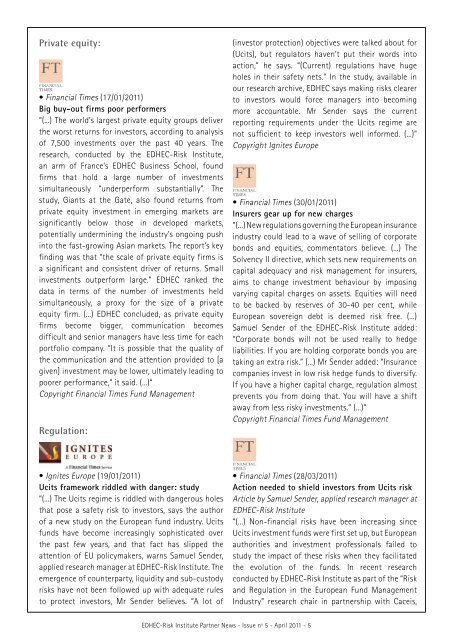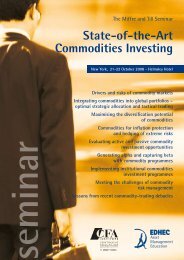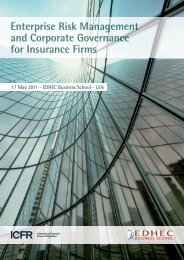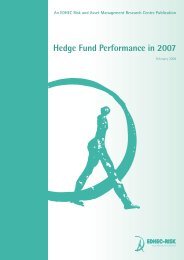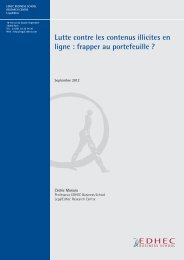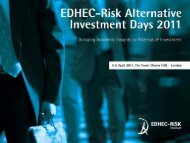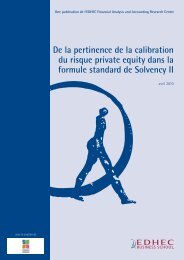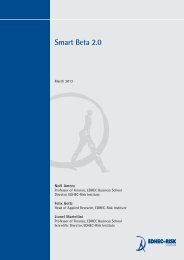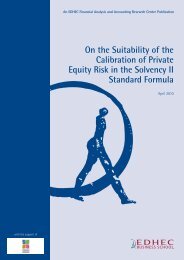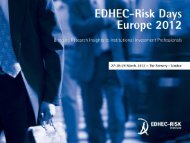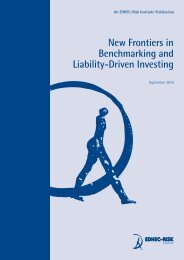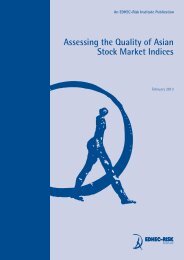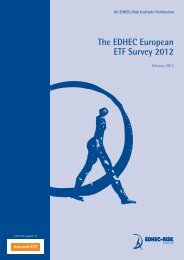You also want an ePaper? Increase the reach of your titles
YUMPU automatically turns print PDFs into web optimized ePapers that Google loves.
Private equity:<br />
• Financial Times (17/01/2011)<br />
Big buy-out firms poor performers<br />
“(...) The world’s largest private equity groups deliver<br />
the worst returns for investors, according to analysis<br />
of 7,500 investments over the past 40 years. The<br />
research, conducted by the <strong>EDHEC</strong>-<strong>Risk</strong> <strong>Institute</strong>,<br />
an arm of France’s <strong>EDHEC</strong> Business School, found<br />
firms that hold a large number of investments<br />
simultaneously “underperform substantially”. The<br />
study, Giants at the Gate, also found returns from<br />
private equity investment in emerging markets are<br />
significantly below those in developed markets,<br />
potentially undermining the industry’s ongoing push<br />
into the fast-growing Asian markets. The report’s key<br />
finding was that “the scale of private equity firms is<br />
a significant and consistent driver of returns. Small<br />
investments outperform large.” <strong>EDHEC</strong> ranked the<br />
data in terms of the number of investments held<br />
simultaneously, a proxy for the size of a private<br />
equity firm. (...) <strong>EDHEC</strong> concluded, as private equity<br />
firms become bigger, communication becomes<br />
difficult and senior managers have less time for each<br />
portfolio company. “It is possible that the quality of<br />
the communication and the attention provided to [a<br />
given] investment may be lower, ultimately leading to<br />
poorer performance,” it said. (...)“<br />
Copyright Financial Times Fund Management<br />
Regulation:<br />
(investor protection) objectives were talked about for<br />
(Ucits), but regulators haven’t put their words into<br />
action,” he says. “(Current) regulations have huge<br />
holes in their safety nets.” In the study, available in<br />
our research archive, <strong>EDHEC</strong> says making risks clearer<br />
to investors would force managers into becoming<br />
more accountable. Mr Sender says the current<br />
reporting requirements under the Ucits regime are<br />
not sufficient to keep investors well informed. (...)”<br />
Copyright Ignites Europe<br />
• Financial Times (30/01/2011)<br />
Insurers gear up for new charges<br />
“(...) New regulations governing the European insurance<br />
industry could lead to a wave of selling of corporate<br />
bonds and equities, commentators believe. (...) The<br />
Solvency II directive, which sets new requirements on<br />
capital adequacy and risk management for insurers,<br />
aims to change investment behaviour by imposing<br />
varying capital charges on assets. Equities will need<br />
to be backed by reserves of 30-40 per cent, while<br />
European sovereign debt is deemed risk free. (...)<br />
Samuel Sender of the <strong>EDHEC</strong>-<strong>Risk</strong> <strong>Institute</strong> added:<br />
“Corporate bonds will not be used really to hedge<br />
liabilities. If you are holding corporate bonds you are<br />
taking an extra risk.” (...) Mr Sender added: “Insurance<br />
companies invest in low risk hedge funds to diversify.<br />
If you have a higher capital charge, regulation almost<br />
prevents you from doing that. You will have a shift<br />
away from less risky investments.” (...)”<br />
Copyright Financial Times Fund Management<br />
• Ignites Europe (19/01/2011)<br />
Ucits framework riddled with danger: study<br />
“(...) The Ucits regime is riddled with dangerous holes<br />
that pose a safety risk to investors, says the author<br />
of a new study on the European fund industry. Ucits<br />
funds have become increasingly sophisticated over<br />
the past few years, and that fact has slipped the<br />
attention of EU policymakers, warns Samuel Sender,<br />
applied research manager at <strong>EDHEC</strong>-<strong>Risk</strong> <strong>Institute</strong>. The<br />
emergence of counterparty, liquidity and sub-custody<br />
risks have not been followed up with adequate rules<br />
to protect investors, Mr Sender believes. “A lot of<br />
• Financial Times (28/03/2011)<br />
Action needed to shield investors from Ucits risk<br />
Article by Samuel Sender, applied research manager at<br />
<strong>EDHEC</strong>-<strong>Risk</strong> <strong>Institute</strong><br />
“(...) Non-financial risks have been increasing since<br />
Ucits investment funds were first set up, but European<br />
authorities and investment professionals failed to<br />
study the impact of these risks when they facilitated<br />
the evolution of the funds. In recent research<br />
conducted by <strong>EDHEC</strong>-<strong>Risk</strong> <strong>Institute</strong> as part of the “<strong>Risk</strong><br />
and Regulation in the European Fund Management<br />
Industry” research chair in partnership with Caceis,<br />
<strong>EDHEC</strong>-<strong>Risk</strong> <strong>Institute</strong> <strong>Partner</strong> <strong>News</strong> - Issue nº 5 - April 2011 - 5


